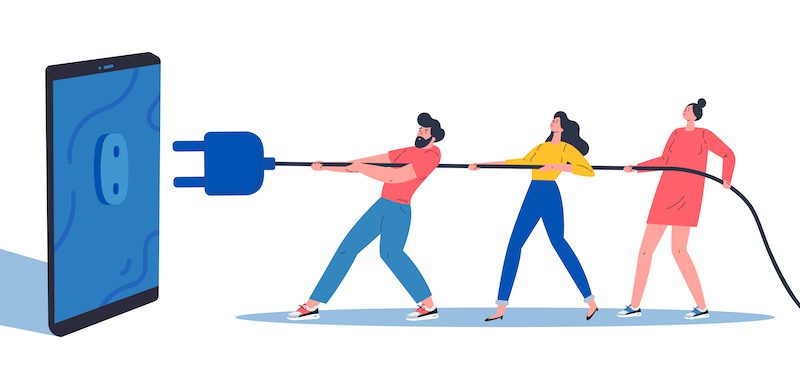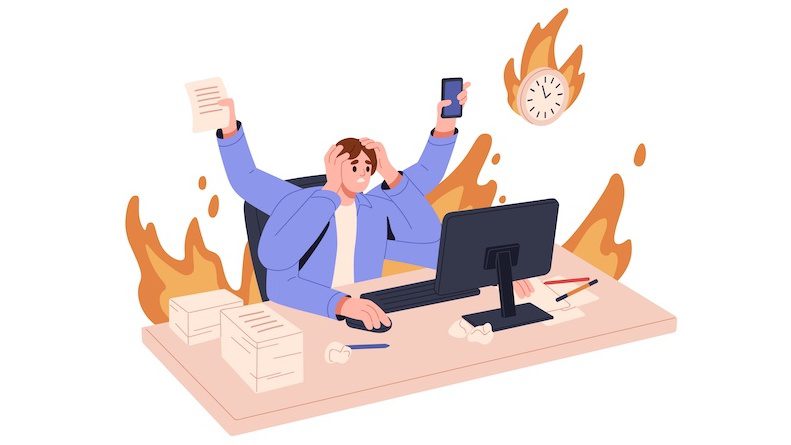The average American spends more than seven hours each day looking at a screen. We speak with an expert about what it means to be mindful and present in a world where countless distractions are in our face. And how to start a digital detox.
Navigating our device-driven world, maintaining focus and preserving sanity can prove to be a formidable challenge. Even individuals considered experts in managing such circumstances struggle with the overstimulation and technology-driven nature of our existences.
“I find in my own life that it takes a lot of discipline to focus on what is important in work and life, and to intentionally push aside distractions and seemingly urgent demands,” says Kathleen Wolf, Ph.D., Research Social Scientist at the University of Washington. “There is social consequence, in that coworkers and friends, even family, sometimes get impatient with me for not responding to their digital outreach almost immediately.”
She adds that she’s “old enough to remember the delays of snail mail and phone tag in communications,” so she’s amused when people ping her for not responding in a day’s time — or even within hours of their message.

Wolf notes two changes related to our society’s attachment to devices. First, she’s observed that our reliance on screens for news and information limits dialogue about important topics. “The constant barrage of sources and content makes deliberate reflection difficult, as thoughts or insights that are taking form are cut off by the next clickbait,” she says. “Our exchanges become anonymized reactions on a digital platform, rather than a thoughtful dialogue exchanged with a degree of civility, even respect, for others who may agree or disagree with us.”
Then, from a science perspective, there are research findings that back up our suspicions. For one, we are constantly attempting to multi-task, and studies show we don’t do that particularly well. “We may respond to multiple prompts and tasks, but the quality of those contributions is compromised,” Wolf says. “Other studies indicate that attending to multiple tasks and attention attractors leads to cognitive fatigue; our brains simply can’t keep up with the pace and perform well.”

Wolf adds that this attention or cognitive decline is not due only to screen time, but also to the increase in various things that demand precious mental reserves — more complex administrative systems in our lives, increased traffic congestion, dealing with the complications of poverty, the unsettling of lives due to COVID and so on.
Wolf sees scientific evidence that we face risks on a cumulative and long-term basis. For example: The heightened emotions and sense of unease of some online content can lead to low-level physiological stress.
“Research on stress first focused on major stress episodes, such as losing one’s job or loss of a loved one,” she says. “More recent stress research shows that constant low-grade stress starts to wear away at various health dimensions, such as mental health and immune system function. Returning to a focus on cognitive function, attention fatigue or depletion is related to, at the very least, inability to be our most productive, creative selves. And indirectly is related to increased frustration, more aggressive behavior and less impulse control — meaning we are more likely to make in-the-moment bad choices.”
So how to combat these frantic times? For Wolf, it’s about having a health-oriented outlook on the role technology plays in our lives. Her opinion: “Exert control over your devices and information inputs. Don’t allow them — and the marketing-oriented companies that provide devices and services — to control your time and attention.” She admits this digital detox is not easy, and even she struggles. “But I feel great satisfaction when I can devote uninterrupted hours, even days, to my goals and projects,” she says.

Access to nature — even in brief spurts — is one way to attend to our well-being. Wolf turns to Attention Restoration Theory, proposed by Rachel and Stephen Kaplan at the University of Michigan some years ago. “[This theory] describes how nature experiences help renew our mental function,” she explains. “Just short amounts of time in nearby nature, that is a park, garden or even green streetscape, really help. Why? Nature settings, particularly those having greater biodiversity, offer lots of sensory experiences that attract our attention without effort. Soft fascination is at play — the sounds of birds, the texture of foliage, the movements of animals … we pay attention to these and other low-level sensory experiences effortlessly, that is, if we actually put aside our screens and devices.”
Personally, Wolf carefully screens and limits her personal social media to real friends and loved ones. She interacts with work and project colleagues on separate platforms. “I’ve learned that my brain is most productive from mid-afternoon to early evening,” she says. “I put aside my phone and try to not look at email at that time on weekdays, and use the time for deep task work.” She also enjoys cycling, kayaking and hiking, activities where her phone stays packed away except for navigation needs or quick check-ins with others.
She also recommends the work (and podcast) of Cal Newport, a Georgetown University computer science professor, who is the author of The New York Times bestseller Digital Minimalism: Choosing a Focused Life in a Noisy World and A World Without Email: Reimagining Work in an Age of Communication Overload.
In the end, Wolf says that for each person, “it comes down to a committed discipline and mindfulness, a commitment to be wholly in the present and not be lured by countless digital distractions. It comes down to deciding and acting on what’s important in life, what you want in life and thinking about how technology can help or hinder those goals.”




